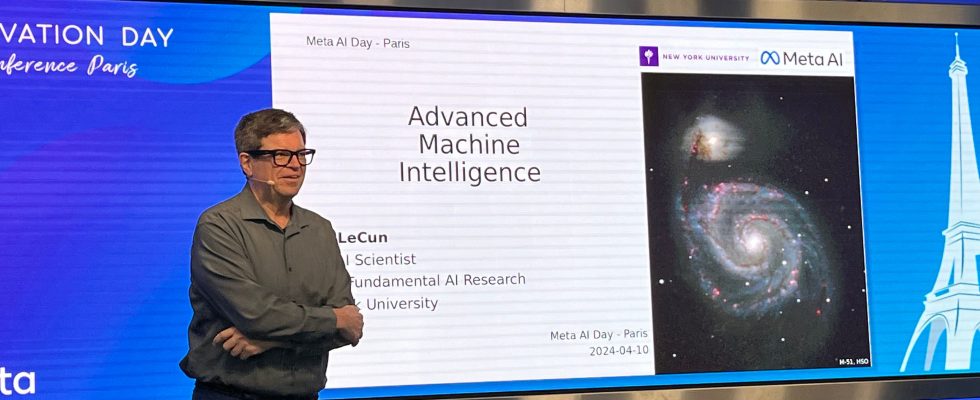Its main competitors like Google or Microsoft, through OpenAI, are making giant strides on their products: chatbots, assistants, and other image, sound and video generators, aimed at the general public. Meta is currently following a unique trajectory in generative artificial intelligence, a technology that is booming across the planet. The company founded by Mark Zuckerberg is investing massively in the invisible infrastructure – chips, supercomputers – that underpins it. And then focus on… knowledge sharing. Author of several cutting-edge language models (LLM), Meta delivers her progress free of charge to the open source scientific community. Without taking full advantage of it herself.
A first, simple reason: Meta is always looking for the right formula. AI is not always very reliable, fast and adaptable. This, while the firm intends to address its “3 billion users” through Facebook, Instagram and WhatsApp, present in more than “a hundred countries”, recalled Joëlle Pineau, vice-president of the research in AI, during an event organized in Paris, Wednesday April 10. A large-scale deployment, “never before achieved, not even by OpenAI [NDLR : le créateur de ChatGPT]”, added Chris Cox, product manager. Meta, not without scandals in its history, and already closely monitored on questions of moderation and disinformation by regulators, is walking on eggshells. Of which fact.
A “FRIEND” who wishes you well
The company thus offered a tentative glimpse of what the introduction of the technology could give to its famous applications. A few prompt image generation on Messenger and Instagram, restaurant recommendations on WhatsApp. Not much more. The company’s latest model, Llama-3, could be the first to heavily invest in Meta’s social networks and immersive devices, and enable these requests. However, its release date and degree of power and precision remain unknown. We just know that it will exist in different versions, and that it will be open source like its predecessors.
This apparent modesty leaves another taste in the mouth. A bit as if Meta reluctantly gave in to “fomo” – that feeling of missing out on something important – and ultimately wouldn’t be all that excited about generative AI as it currently presents itself.
Present alongside Joëlle Pineau and Chris Cox, Yann LeCun confirmed this hypothesis. The Frenchman, winner of the Turing Prize in mathematics and figure in AI at Meta, has maintained his belief in a “super-intelligence”, capable of being useful to humans. But it still has to be really at his level. While AI has been struggling for years to try to drive a car autonomously, “a 17-year-old boy can learn to drive in just twenty hours,” he criticized, for example. Thanks to his vision, his nervous connections and his ability to reason, even if weak, a 4-year-old child is, according to him, more competent than an LLM. The problem with these fundamental models, at the basis of generative AI applications, comes from their learning, mainly based on “texts”, which do not allow us to “understand how the world works”. They are used today to deploy applications for text and images in a basic way, and draw a “short-term” vision of what AI can offer, LeCun continued.
The expert believes that the real AI revolution will take a few more years. And that it will rather go through new models. Why not an “AMI”, for “Advanced machine intelligence”. A completely new approach – its own – based on an innovative learning architecture (JEPA) centered around the notion of context, which will allow AI to better understand the world, to plan complex and hierarchical tasks, to have a persistent memory, to finally be safer. Or characteristics closer to human capabilities. This sheds further light on Meta’s wait-and-see approach to generative AI, which is more inclined to share knowledge than to commercialize solutions, unlike OpenAI, the current market leader. “Do we have the scientific capabilities we need for the product we want?” LeCun finally asked, without answering. Suggesting that the answer for the moment is: “No”.
